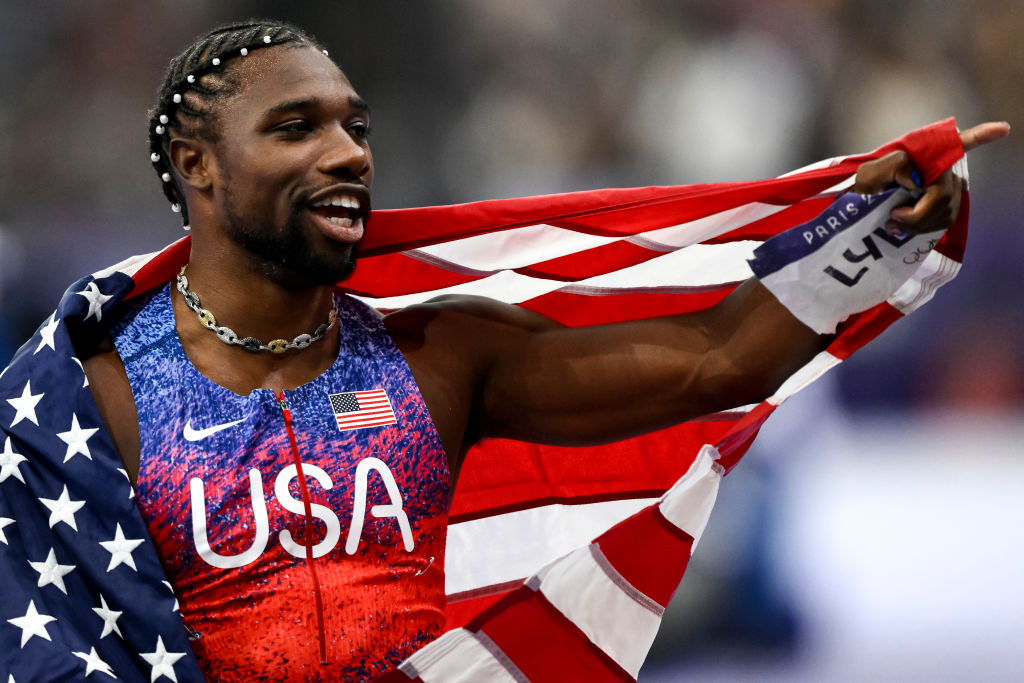-
 play_arrow
play_arrow
Foxy 106.9
-
 play_arrow
play_arrow
Dr. Candice Carter-Oliver Interview
Noah Lyles Beats The Odds, Reveals Personal Health Struggles After Winning the Gold

Source: Insidefoto / Getty
Meer milliseconds separated the gold, silver and bronze medalists during the 100-meter final this past Sunday at the Olympics at the Stade de France. American sprinter Noah Lyles walked away with that gold medal, becoming the fastest man in the world.
He earned the victory and the title by beating the man with the world’s fastest time this year—Jamaica’s Kishane Thompson. He bested him by 0.005 of a second for a personal best of 9.784 seconds.
“We were waiting for the names to pop up, and I’m going to be honest, I came over [to Thompson] and I was like: ‘I think you got that one, big dawg!’” Lyles said in a news conference after the race. “Something said I need to lean, and I was like, ‘I’m going to lean,’ because it’s that type of race.”
Lyles will have a chance to defend that title come Wednesday (August 7) if he makes the 200-meter finals. His only other Olympic medal is a bronze which he won during the 200-meter race at the Tokyo Games 3 years ago. If he ends up winning the 200-meter race, he’ll become the first man to win both events in an Olympics since Usain Bolt.
The 27-year-old track and field star is garnering attention for his reaction upon winning Sunday’s race. After crossing the finish line, he tore off his race bib, placed it in the air, faced the first camera he saw and said “America, I told you! I got this!”
I Told You America I Got This! #OlympicChampion pic.twitter.com/boBOZv3650
— Noah Lyles, OLY (@LylesNoah) August 4, 2024
Soon after he followed up with an encouraging tweet that read “I have asthma, allergies, dyslexia, ADD, anxiety and depression. But, I will tell you that what you have does not define what you can become. Why not you!”
I have Asthma, allergies, dyslexia, ADD, anxiety, and Depression.
But I will tell you that what you have does not define what you can become.
Why Not You!
— Noah Lyles, OLY (@LylesNoah) August 4, 2024
The World Health Organization (WHO) recognizes depression as the second greatest cause of disability in the world. In a 2007 study led by WHO, the burden of depression was compared to chronic illnesses such as asthma and diabetes. Depression can lead to anxiety, low energy, loss of interest and poor concentration which could affect the ability to complete activities of daily living.
That was not the case for Noah Lyles who sprinted towards success, becoming an olympian. If you allow it, any debilitating medical condition can become a crutch for not rising to your full potential. It’s up to you to beat the odds.
If depression is your crutch, there are several ways to beat the odds. According to Healthline, exercise is helpful as well as journaling, having a routine, getting enough sleep, changing your diet and limiting drugs and alcohol.
You may not become an olympian, but you can become the best version of yourself.
DON’T MISS…
Channeling Your Inner Olympian: A 5-Day Workout Plan
A New TikTok Trend Claims Sour Candy Diminishes Anxiety
These Black-Owned Wellness Havens Are Helping Us Reclaim Our Wholeness
The post Noah Lyles Beats The Odds, Reveals Personal Health Struggles After Winning the Gold appeared first on Black America Web.

-
4942 Delmar Blvd.
St. Louis, MO. 63108
CONTACT US
- 314-782-FOXY (3699) OFC
- 314-944-1069 REQUEST LINE
- [email protected]
- ADVERTISING INQUIRIES
- [email protected]
FOXY QR CODE


